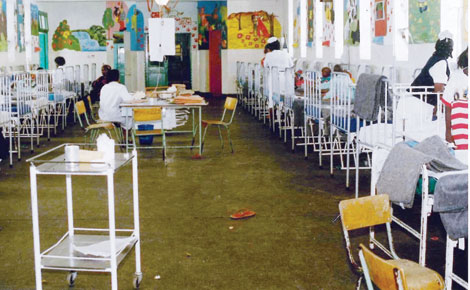 Three cases of bacillary angiomatosis have been reported in Kenya and Uganda. [PHOTO: FILE / STANDARD]
Three cases of bacillary angiomatosis have been reported in Kenya and Uganda. [PHOTO: FILE / STANDARD]
By GATONYE GATHURA
NAIROBI, KENYA: While cats make perfect pets for some people, a study has revealed that they could cost you your life.
A life threatening disease being spread by cat fleas and with symptoms like the well-known skin cancer - Kaposi sarcoma- is stalking Kenya. Worse still, the country has no capacity or expertise to diagnose or treat the condition.
“This is a major health concern because the disease is mimicking the much more prevalent Kaposi sarcoma and it could mean many people are being treated for the wrong condition,” says Dr Naftali Busakhala of Moi University, one of the researchers tracking the disease.
Kaposi sarcoma is the most prevalent cancer in Kenya representing more than a third of all tumours in the country today. “This emerging disease, which has not been reported before in the country is a major challenge especially because of lack of pathologists and the necessary diagnostic facilities,” says Busakhala who together with a team of American scientists have been tracking the disease.
The issue came to light last month when Dr Busakhala and colleagues from Yale and California universities of the US told of three patients from Kenya and Uganda who have been diagnosed with the disease called bacillary angiomatosis (BA).
SPECIALISED DIAGNOSES
The three had been diagnosed with Kaposi sarcoma locally and subsequently put on medication for the cancer, which did not seem to work.
Wednesday, Dr Busakhala explained that in Kenya, the cancer is mainly diagnosed through observation and when treated, 40 per cent of the patients will respond well.
This means that six out of 10 patients who are put on medication do not respond well but now it emerges that they may have been infected by the new condition called BA.
Specimens from the three cases, Dr Busakhala explained were then collected and taken to the US universities for specialised diagnoses where it was confirmed that the patients were indeed suffering from BA and not Kaposi sarcoma.
HIV PATIENTS
“These three cases, to our knowledge, are the first reports of BA in East Africa in biomedical literature. Each had been originally incorrectly diagnosed as the Kaposi cancer,” the team wrote in the Journal of the International Association of Providers of Aids Care last Wednesday.
The University of California has extensively studied this emerging disease in the US where it emerged a few years ago and says when diagnosed correctly, it is easy to treat with antibiotics, but otherwise, it can be fatal.
The university has linked the disease with the close interaction between humans and cats and especially people who are HIV positive. In one of the most extensive studies so far on the disease, investigators had wanted to know how earlier patients in the US had been interacting with their cats.
“Because of the numerous anecdotal reports suggesting that cat exposure preceded symptoms of BA, we queried subjects in detail regarding a wide range of animal exposures, including physical and sexual contact, and questioned pet owners about specific interactions with their pets,” says one of the University of California studies.
“BA has been a rare condition locally, hence I do not expect our pathologists to be competent in picking up the disease routinely,” says Prof Nicholas Othieno-Abinya, an oncologist at the University of Nairobi.
Dr Busakhala agrees that the biggest challenge in dealing with this and other emerging diseases is the lack of pathologists and the necessary diagnostic equipment.
 The Standard Group Plc is a multi-media organization with investments in media
platforms spanning newspaper print
operations, television, radio broadcasting, digital and online services. The
Standard Group is recognized as a
leading multi-media house in Kenya with a key influence in matters of national
and international interest.
The Standard Group Plc is a multi-media organization with investments in media
platforms spanning newspaper print
operations, television, radio broadcasting, digital and online services. The
Standard Group is recognized as a
leading multi-media house in Kenya with a key influence in matters of national
and international interest.











